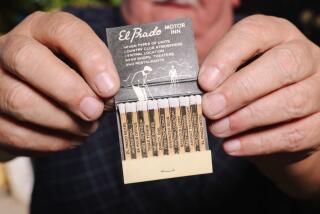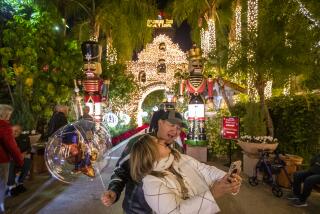WESTMINSTER : Museum’s Building Is Rich in History
- Share via
Legend has it that a benefactor dropped the deed to the original Midway City Women’s Club property by plane in 1928. Sixty years later, the building, which was moved to Blakey Historical Park in 1988, became the home of the Westminster Museum.
“The Midway City Women’s Club was the social center for the Huntington Beach area,” said Joy Neugebauer, president of the Westminster Historical Society. “Now it lends itself well to being a museum, with its hardwood floors, beam ceiling and small stage.”
Midway City was founded in the early 1920s by John H. Harper, who laid out the streets, installed sidewalks and curbs and sold lots and who became the club’s benefactor.
When the Depression hit the city in the late 1920s, the city had 28 homes but no social or civic organizations. In 1928, 27 women organized the “Ladies Social and Civic Club” and began holding meetings at the homes of its members.
At the club’s second meeting, the crowd overflowed onto the sidewalk, and “that’s when they decided they needed a building,” Neugebauer said.
Harper awarded the city a 53-by-120-foot lot to build a clubhouse, and residents raised $4,500 for construction of the building. In 1929 the house was completed, and in 1931 it was officially named the Midway City Women’s Club.
From 1930 to 1945, club members worked to offset the effects of the Depression by holding luncheons, teas, monthly card parties, dances, raffles and talent shows and by renting space to other local organizations.
In 1935, the club joined the Federation of Women’s Clubs and sponsored the opening of the Midway City Branch Library.
Through the years, the club sponsored political meetings, voting days, fund-raisers for Cub and Girl Scout troops, scholarships, and city and school beautification projects. Members also prevented a roadhouse and a dump from coming into the area and prevented a tavern from opening next to the clubhouse.
“Everybody in the community used the clubhouse,” Neugebauer said. “Without TV and Monday night football, men and women spent time together, and people did more family-oriented activities.”
More to Read
Sign up for Essential California
The most important California stories and recommendations in your inbox every morning.
You may occasionally receive promotional content from the Los Angeles Times.










